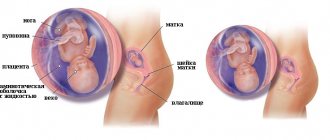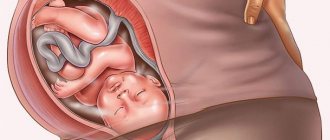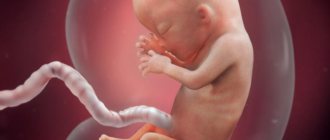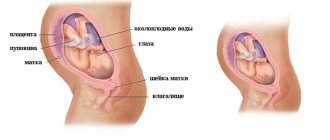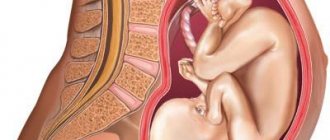Rating: 5/5 (1)
The 11th obstetric week of pregnancy is the most exciting part of the first trimester. The embryonic stage has come to an end and the active period of fetal growth has begun.
The expectant mother will see her unborn baby for the first time during an ultrasound examination, find out the due date and undergo the first screening tests and tests.
Mom's health is gradually improving. The most favorable period – the second trimester is just around the corner. Now you can start enjoying life!
Fetal size and development at 11 weeks of gestation
The eleventh week of pregnancy is a time of active preparation of the baby for a future full life. During this period, an increasing amount of oxygen and nutrients enters the fetus through the umbilical cord.
Height, weight and appearance of the fetus
Measured from the crown of the head to the sacrum, the fetus measures 3.8-4.3 cm, its femur length is about 7 mm, and its head measures 18 mm. The weight of the baby is approximately 7-8 g, in size it can be compared to a small lemon.
Despite its miniature size, in appearance it is an almost fully formed little man , although somewhat reminiscent of an alien.
Its unusual appearance is, first of all, given by its enlarged head in relation to the size of its body. This head size is due to the need for intensive formation of nerve endings in the brain. Due to the development and strengthening of the neck, the chin is separated from the chest and the baby can already raise his head .
The second interesting feature of the fruit is the arms, which are longer than the legs. At week 11, the fingers and toes are finally formed and separated from each other. Little fingers already have marigolds. The palms are actively developing, and the baby begins to develop grasping reflexes. Legs and arms will continue to grow, but already during this period the baby can actively move and bend his limbs.
Formation of organs and body
skin is still transparent, all the blood vessels are visible through it. The circulatory system is entering the stage of final formation. During this period, in addition to red blood cells, leukocytes also appear in the blood, thereby beginning to build the fetal immune system.
A child's heart works like an adult's, making 130-160 beats per minute. The photo shows that the body of the embryo at the 11th week of pregnancy is already very similar to a child.
The skeletal system continues to develop, internal organs are actively growing, and the umbilical cord and intestines are temporarily connected. Although the fetus is fed through the umbilical cord, the intestines begin to contract , and the kidneys remove waste products from the body.
At this time, all organs begin to perform their assigned functions: the liver, thyroid gland work and the stomach muscles contract. Baby teeth are formed in the gums of the baby, the iris of the eyes is built, hair follicles appear and the endocrine system is formed. For the first time, the baby makes swallowing and sucking movements .
From this week, distinctive features of the fetus's gender , although not a single ultrasound can reliably determine the gender due to its miniature size.
Baby's behavior
A stronger skeletal system contributes to greater fetal activity . Now the baby, touching the edge of the placenta, can rest his limbs and push against the walls. However, the expectant mother will not yet feel these movements; the fetus is still too small.
During this period, the little man already reacts to external stimuli .
For example, he may feel the mother's cough or sudden movements.
What happens in a woman's body
During this period, rarely does anyone experience nausea and aversion to food, but frequent urination and constipation are a constant companion. The size of the breasts is increased, they are more sensitive and may be painful. The belly characteristic of pregnant women appears and begins to grow.
In addition to these signs, itching of the skin is added, which bothers about a quarter of women, but at a later date. Some dark-skinned ladies may have a dark stripe in the middle of their abdomen. Due to the fact that the uterus is quite large, it can compress the veins of the small pelvis and provoke an exacerbation of hemorrhoids.
If the child’s development is disrupted at this stage, it is mainly the endocrine and reproductive systems that are affected.
What happens to mom at 11 weeks of pregnancy
The growth of the fetus is accompanied by changes in the body of the expectant mother. Changes manifest themselves individually, although there are common characteristic features.
Mom's belly grows
The uterus, adapting to the size of the fetus, expands, filling the space of the pelvic area. A gynecologist, by palpating the peritoneum, can already determine the size of the uterus.
The growth of the abdomen is not necessarily noticeable during this period ; for some, the tummy is rounded earlier, for others later than this period. This is due to the peculiarities of the physique and attachment of the placenta. Tall women with a deep pelvis will notice virtually no changes in their figure, while short women with a narrow pelvis will enjoy a rounded tummy. Above you can see photos of moms' bellies at 7 weeks pregnant.
Mom's weight gain
The active formation of fetal organs and systems helps to increase the mother's metabolism by 25%. Such enhanced metabolic processes lead to rapid burning of consumed calories and an increase in appetite.
The average weight gain by the end of the first trimester (week 13) is 1-2 kilograms. Some women note an increase in the volume of the breasts and buttocks, others - the abdomen and hips. Although calories are actively burned, you should not overeat and allow unnecessary weight gain.
Sensations, toxicosis, pain at 11 weeks of pregnancy
During this period, most women will breathe a sigh of relief, because many negative manifestations of pregnancy will disappear:
- the mammary glands will lose their excessive sensitivity and soreness;
- dizziness, lethargy, and increased fatigue will no longer bother you;
- toxicosis and increased salivation will disappear.
Instead of the above signs of pregnancy, new ones may appear , such as:
- sweating and thirst;
- discharge of colostrum from the breast;
- heartburn and lack of stool;
- increased drowsiness and absent-mindedness;
- lack of calcium;
- cramps of the calf muscles;
- increased bleeding of gums;
- skin problems.
The absence or manifestation of symptoms is individual for each woman. If you experience any discomfort or pain, you should immediately consult a doctor .
Discharge at 11 weeks of pregnancy
The entire period of pregnancy is accompanied by vaginal discharge. At the end of the first trimester, the amount of secretion increases . Light, thick discharge with a slightly sour odor is considered normal. You can read more about them here.
If bloody, cheesy or purulent secretion with an unpleasant odor is released from the vagina, you should immediately consult a doctor .
Psychological condition
Characteristic of the first trimester of pregnancy is general emotional instability , similar to mood swings during the premenstrual period.
Due to hormonal changes, a woman’s mood very quickly changes from irritability to unmotivated joy. The change of emotions happens suddenly. Anxiety, restlessness and tearfulness are frequent guests in the home of a pregnant woman.
Help and support from the family plays an important role in the emotional state of the expectant mother.
Tests, examinations and ultrasound in the 11th week of pregnancy
When registering each pregnant woman, the observing obstetrician-gynecologist, in addition to studying general parameters (height, weight, blood pressure, body temperature, general blood and urine analysis, coagulogram, smear cytology), prescribes additional studies . These include:
Double test (prenatal screening and biochemical screening). This test is aimed at identifying possible pathologies in the development of a child. To study, a blood test from a vein is required. The pathological marker is the level of pregnancy-associated plasma protein-A (PAPP-a) and human chorionic gonadotropin (b-hCG) in the blood.
This analysis suggests a congenital chromosomal abnormality - Down syndrome, but the final diagnosis is confirmed with the help of additional studies.
Ultrasound examination of the fetus. It is at the 11th week that a specialist can obtain the necessary information about the course of pregnancy, the development of the fetus, eliminate the tone of the uterus, and also clarify the gestational age (above you can see a photo of an ultrasound scan of the fetus at the 11th week).
The necessary study parameters are:
- fetal motor activity;
- heartbeat;
- proper development of organs;
- fruit size;
- place of attachment of the fetus;
- location of the placenta;
- quantity and quality of amniotic fluid;
- condition of the uterus.
Thanks to ultrasound, the doctor can diagnose abnormalities or pathologies in the development of the fetus in the early stages. We invite you to watch a video of an ultrasound of the fetus at 11 weeks of pregnancy.
Tips and tricks
If you have not registered yet, then week 11 is the deadline at which the doctor manages to identify complications and correct them without consequences. Basic tips that will help you feel good and allow your child to develop correctly include:
- Balanced diet.
- No bad habits.
- Moderate physical activity – walking, daily exercises.
- Positive emotions.
- Prevention of colds.
If you follow all the recommendations, then pregnancy will become a pleasant state for you that you will want to experience again and again.
Possible deviations from the norm, threat of miscarriage
Although the concept of normal is still relative, there are certain conditions and processes that threaten the normal course of pregnancy.
- Pain. Any pulling and cutting pain in the lower back and lower abdomen may indicate a threat of miscarriage. During a normal pregnancy, there should be no pain symptoms. Read more about this threat here.
- Bleeding. At the end of the first trimester, bleeding signals an ongoing miscarriage. The cause may be a frozen fetus that is rejected by the uterus. If you quickly consult a doctor, the child can be saved.
- Some sexually transmitted and general diseases of the genital organs can provoke the appearance of bloody discharge. In this situation, you should also not hesitate to contact a specialist.
- Discharge. In the penultimate week of the first trimester, white or clear discharge without an unpleasant odor is considered normal. If a grey, green or yellow secretion with a characteristic unpleasant odor is released from the genitals, accompanied by itching, tissue swelling or redness, it is imperative to consult a gynecologist. Bubbling, purulent, mucous and curdled discharge are especially dangerous for the fetus.
- Heat. Normal for this week of pregnancy is a slightly increased body temperature to 37-38 C. Subsequently, from the 12th week of the prenatal period, the temperature should drop. If this does not happen, you should seek advice from a doctor and take antipyretic medications.
- Enlarged belly. Usually during these stages of pregnancy, the mother's belly is small as the fetus is still very small. If the expectant mother has a large abdomen, an ultrasound examination should be performed. The likely cause of this size of the abdomen may be a tumor or errors in determining the duration of pregnancy.
Mom's diet and exercises at 11 weeks of pregnancy
The health of any person directly depends on proper nutrition and exercise. A pregnant woman is no exception.
A properly formulated diet will ensure that the body of mother and child needs all the necessary vitamins, microelements and minerals; iron, iodine and calcium are especially important in this trimester.
During this period, food should be natural and varied , containing fats, proteins and carbohydrates. The most useful foods for a young mother are lean meat, fish, cottage cheese, cereals, nuts, raw vegetable oils, herbs, fruits and vegetables. It is important to drink more liquid: clean water, juices and fruit drinks.
Fatty, fried, spicy and salty foods should be avoided. The amount of food consumed should not cause discomfort in the gastrointestinal tract; it is better to eat frequently and in small portions.
Physical activity , if there is no threat of pregnancy failure and other contraindications, is beneficial for a woman’s health. Doctors recommend moderate exercise: regular walks, exercises or special exercises for pregnant women. Mothers who regularly engage in gymnastics have an easier time bearing a child and coping with labor.
Nutrition
Your baby continues to develop and his future health directly depends on what you eat.
The diet must include fresh vegetables and fruits rich in vitamins. To form bones and muscles, protein is needed, which is abundant in meat and fish. You should not give up dairy products - cheese, cottage cheese, natural yoghurts. Constipation often occurs at 11 weeks, so preference should be given to plant foods, kefir. Among the drinks, choose rosehip decoctions, compotes, fruit drinks, freshly squeezed juices; you should avoid carbonated drinks. Eat more garlic and onions, this will help you avoid colds. Cereals and all types of nuts are good for your baby, and fried and too fatty foods are much less beneficial.
Sexual relations at 11 weeks
Provided the expectant mother is in good health and has no nagging pain in the lower abdomen or bleeding, intimate relationships with a partner are not contraindicated. Doctors recommend during this period not to choose positions with deep penetration, which can cause discomfort in a woman.
During sex, a woman’s body produces happiness hormones – endorphins, which are passed on to the child through the blood. Sexual intercourse helps maintain vaginal muscle tone, preparing the body for childbirth.
Recommendations for the expectant mother
There are no special rules or recommendations for expectant mothers; there are only the most general tips:
- spend as much time as possible outdoors;
- avoid places with large crowds of people;
- include moderate physical activity in your daily routine;
- make time for rest;
- create a balanced diet;
- avoid emotional stress and stress;
- monitor your health (discharge, body temperature, discomfort);
- pay attention to the condition of the skin and blood vessels;
- do not drink alcohol or smoke;
- Take medications only after consultation with your doctor.
Remember, only positive emotions and attention to your own health will help you go through all stages of pregnancy and childbirth safely.
What to do this week
Set yourself up for positive emotions, walk more, this will not only strengthen your immune system, but also ensure sound sleep. Week 11 is the time to think about changing your wardrobe, at the same time you can look for information about childbirth preparation courses and the best maternity hospitals.
Be sure to create a life schedule for the coming months. It may include exercise, listening to music, and a certain amount of time to relax. Report all your experiences to your husband, be sure to share all your emotions with him and you will become even closer, there will be no misunderstandings and fears will recede.
